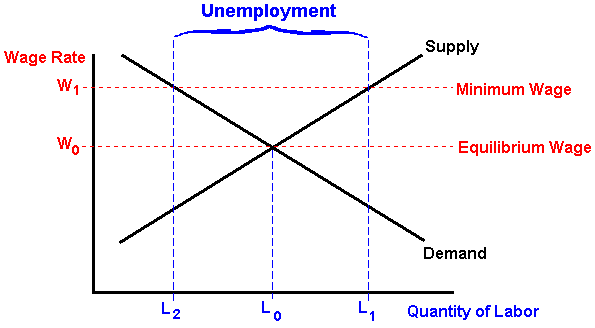A few days ago, we used supply-and-demand curves to illustrate how taxes reduce economic output. Supply-and-demand curves also can be used to examine the impact of minimum wage laws on the labor market.
Supply-and-demand curves also can be used to examine the impact of minimum wage laws on the labor market.
Workers understandably will be willing to supply more labor at higher wages. Employers are just the opposite. They demand more labor when wages are low.
In an unfettered market, the interplay of supply and demand will result in an “equilibrium wage.” But as you can see from the chart, if politicians impose a minimum-wage mandate above the equilibrium level, there will be unemployment.
Some folks, though, may not be overly impressed by theory. So how about empirical research.
Other folks, though, may prefer real-world examples rather than academic studies. We’ve already looked at the bad results when the minimum wage was increased in Michigan. Now we have some more unfortunate evidence from the state of Washington.
Seattle Magazine has a story about a bunch of restaurants closing because of an increase in the minimum wage.
The article starts by noting a bunch of eateries are being shut down.
Last month—and particularly last week— Seattle foodies were downcast as the blows kept coming: Queen Anne’s Grub closed February 15. Pioneer Square’s Little Uncle shut down February 25. Shanik’s Meeru Dhalwala announced that it will close March 21. Renée Erickson’s Boat Street Café will shutter May 30… What the #*%&$* is going on?
Hmmm…so what’s changed. It’s not higher food prices. It’s not a change in dining preferences of consumers.
Instead, government intervention is having a predictable effect.
…for Seattle restaurateurs recently, …the impending minimum wage hike to $15 per hour. Starting April 1, all businesses must begin to phase in the wage increase: Small employers have seven years to pay all employees at least $15 hourly; large employers (with 500 or more employees) have three. Since the legislation was announced last summer, The Seattle Times and Eater have reported extensively on restaurant owners’ many concerns about how to compensate for the extra funds that will now be required for labor: They may need to raise menu prices, source poorer ingredients, reduce operating hours, reduce their labor and/or more.
An industry expert tries to explain the new reality of coping with higher costs.
Washington Restaurant Association’s Anton puts it this way: “It’s not a political problem; it’s a math problem.” …he says that if restaurant owners made no changes, the labor cost in quick service restaurants would rise to 42 percent and in full service restaurants to 47 percent. “Everyone is looking at the model right now, asking how do we do math?” he says. “Every operator I’m talking to is in panic mode, trying to figure out what the new world will look like.”
Well, we know what “the new world will look like” for many workers. They’ll be unemployed.
So you can understand why this issue is so frustrating. Politicians posture about helping workers, but they wind up displaying their economic ignorance and real-world innumeracy, and innocent people pay the price.
